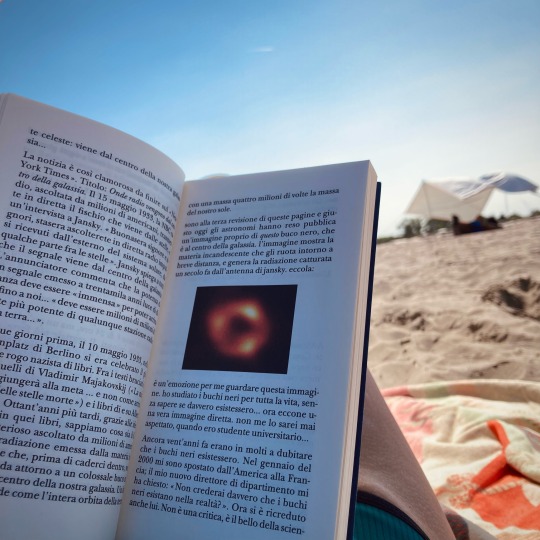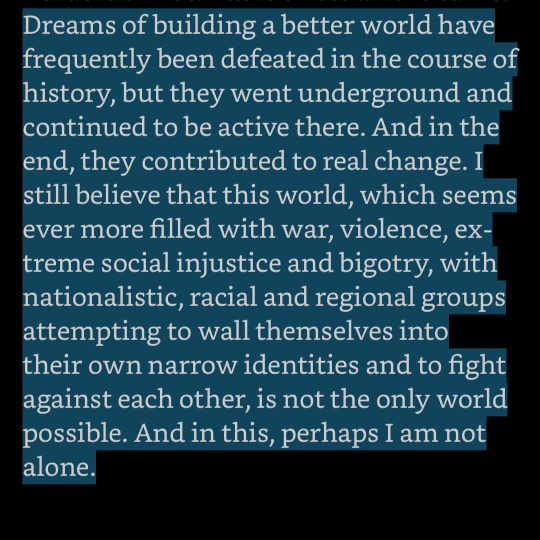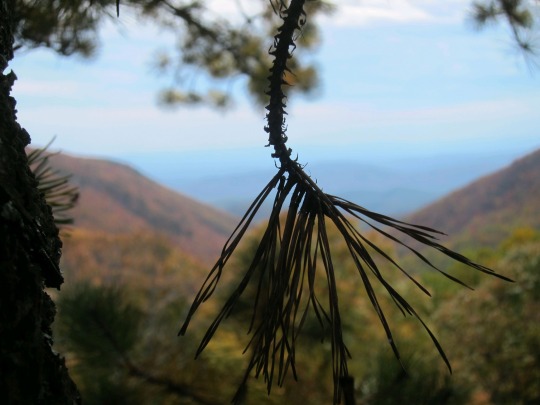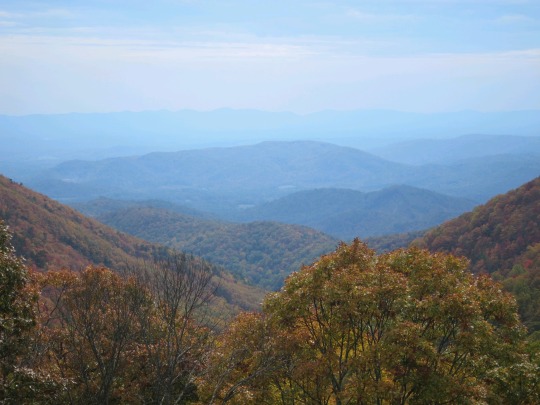#carlo rovelli
Text


Black holes that go to the sea ☀️
#1st day of sea#beachday#beachvibes#summer#black holes#white hole#books#physics student#physics book#studyblr#physics#study life#astrophysics#carlo rovelli
151 notes
·
View notes
Text
"We always make the mistake of thinking of ourselves as different from the world around us, of thinking that we are looking at it from the outside. We forget that we are like other things – that we, too, are like the things we look at.
Carlo Rovelli, in White Holes, 2023.
37 notes
·
View notes
Text

The Rose - Annie French (Scottish Artist)
* * * *
The world is not a collection of things, it is a collection of events. A stone is prototypical 'thing': we can ask ourselves where it will be tomorrow. Conversely, a kiss is an 'event'. It makes no sense to ask where the kiss will be tomorrow. The world is made up of networks of kisses, not of stones. On closer inspection, in fact, even the things that are most 'thing-like' are nothing more than long events.
- Carlo Rovelli
[alive on all channels]
21 notes
·
View notes
Quote
The entire evolution of science would suggest that the best grammar for thinking about the world is that of change, not of permanence. Not of being, but of becoming.
We can think of the world as made up of things. Of substances. Of entities. Of something that is. Or we can think of it as made up of events. Of happenings. Of processes. Of something that occurs. Something that does not last, and that undergoes continual transformation, that is not permanent in time. The destruction of the notion of time in fundamental physics is the crumbling of the first of these two perspectives, not of the second. It is the realization of the ubiquity of impermanence, not of stasis in a motionless time.
Thinking of the world as a collection of events, of processes, is the way that allows us to better grasp, comprehend, and describe it. It is the only way that is compatible with relativity. The world is not a collection of things, it is a collection of events.
The difference between things and events is that things persist in time; events have a limited duration. A stone is a prototypical “thing”: we can ask ourselves where it will be tomorrow. Conversely, a kiss is an “event.” It makes no sense to ask where the kiss will be tomorrow. The world is made up of networks of kisses, not of stones.
The basic units in terms of which we comprehend the world are not located in some specific point in space. They are—if they are at all—in a where but also in a when. They are spatially but also temporally delimited: they are events.
Carlo Rovelli, The Order of Time
431 notes
·
View notes
Text
“Il ricordo e la nostalgia. Il dolore dell’assenza. Ma non è l’assenza che provoca dolore. Sono l’affetto e l’amore. Se non ci fosse affetto, se non ci fosse amore, non ci sarebbe il dolore dell’assenza. Per questo anche il dolore dell’assenza, in fondo, è buono e bello, perchè si nutre di quello che dà senso alla vita.”
Carlo Rovelli - L’ordine del tempo
18 notes
·
View notes
Text
"Science, I believe is a passionate search for always newer ways to conceive the world. Its strength lies not in the certainties it reaches but in a radical awareness of the vastness of our ignorance. This awareness allows us to keep questioning our own knowledge, and, thus, to continue learning. Therefore the scientific quest for knowledge is not nourished by certainty, it is nourished by a radical lack of certainty. Its way is fluid, capable of continuous evolution, and has immense strength and a subtle magic. It is able to overthrow the order of things and reconceive the world time and again."
Carlo Rovelli, 'The First Scientist: Anaximander and His Legacy'
374 notes
·
View notes
Quote
Nāgārjuna's thought is based around the idea that nothing has existence in itself. Everything exists only through dependence on something else, in relation to something else. The term that Nāgārjuna uses to describe this lack of essence per se is 'emptiness' (śunyātā): things are 'empty' in the sense that they do not have autonomous reality; they exist only thanks to, as a function of, with respect to, and in the perspective of something else.
If I look at a cloudy sky - to take a rather basic example - I can see a dragon and a castle. Do the dragon and the castle really exist there, in the sky? Obviously not: they grow out of an encounter between the appearance of the clouds and the sensation and thoughts in my mind; on their own, they are empty entities, they do not exist. So far, so easy. But Nāgārjuna also suggests that the clouds, the sky, our sensations, my thoughts and indeed the very head in which those thoughts are taking place are actually nothing but things which emerge from the encounter with other things: on their own, they are empty entities.
Is it me who sees a star? Do I exist? No, I am no exception to the rule. Who is it who sees the star then? No one, says Nāgārjuna. Seeing the star is a component of that whole, that set of interrelations, which I conventionally call being myself. He also writes that 'What language expresses does not exist. The circle of thoughts does not exist' (XVIII, 7). There is no ultimate or mysterious essence to understand that is the true essence of our being. 'I' is nothing other than the vast and interconnected set of phenomena that constitute it, each one dependent on something else.
Centuries of Western concentration on the subject seem to vanish like morning mist.
Carlo Rovelli, There Are Places in the World Where Rules Are Less Important Than Kindness
142 notes
·
View notes
Text
Noi esseri umani viviamo di emozioni e pensieri. Ce li scambiamo quando siamo nello stesso luogo e nello stesso tempo, parlandoci, guardandoci negli occhi, sfiorandoci la pelle. Ci nutriamo di questa rete di incontri e scambi, anzi siamo questa rete di incontri e scambi. Pensieri e emozioni che ci legano gli uni agli altri non hanno difficoltà ad attraversare mari e decenni, talvolta perfino secoli. Legati a esili fogli di carta oppure danzanti fra i microchip di un computer. Siamo parte di una rete che va molto al di là dei pochi giorni della nostra vita, dei pochi metri quadrati dove muoviamo i nostri passi.
Carlo Rovelli - L'ordine del tempo
Ph Helmut Newton
15 notes
·
View notes
Text
“This is time for us. Memory. A nostalgia. The pain of absence. But it isn't absence that causes sorrow. It is affection and love. Without affection, without love, such absences would cause us no pain.
For this reason, even the pain caused by absence is in the end something good and even beautiful. Because it feeds on that which gives meaning to life.”
—Carlo Rovelli, The Order of Time
#carlo rovelli#the order of time#writer#author#quotes#poet#poetry#booklr#bookstagram#writers of tumblr#book lover#prose#time#life#memories#nostalgia#novel
34 notes
·
View notes
Text
We have access only to perspectives. Reality is perhaps nothing other than perspectives. There is no absolute. We are limited, impermanent. And precisely for this reason, to live, to be, as we do, is so light and sweet . . .
2 notes
·
View notes
Text
“We are a species that is naturally moved by curiosity, the only one left of a group of species (the genus Homo) made up of a dozen equally curious species. The other species in the group have already become extinct—some, like the Neanderthals, quite recently, roughly thirty thousand years ago. It is a group of species that evolved in Africa, akin to the hierarchical and quarrelsome chimpanzees—and even more closely akin to the bonobos, the small, peaceful, cheerfully egalitarian, and promiscuous type of chimps. A group of species that repeatedly went out of Africa in order to explore new worlds, and went far: as far, eventually, as Patagonia—and as far, eventually, as the moon.
It is not against nature to be curious: it is in our nature to be so.
One hundred thousand years ago our species left Africa, compelled perhaps by precisely this curiosity, learning to look ever farther afield. Flying over Africa by night, I wondered if one of those distant ancestors setting out toward the wide-open spaces of the North could have looked up into the sky and imagined a distant descendant flying up there, pondering on the nature of things, and still driven by his very same curiosity.”
-Carlo Rovelli, Seven Brief Lessons on Physics
#carlo rovelli#physics#pondering#dude loves his commas#do Not get me wrong i don’t mean this in a manifest destiny ass way#more so in like a ohhhh my god brother#kinda way#also idk why the spacing is like that
4 notes
·
View notes
Note
17 for the book ask, please :)
A book that surprised me was “Seven Brief Lessons on Physics” by Carlo Rovelli! I never would have expected a nonfiction book to move me so much but my goodreads review was, “This is a book about science that makes you fall in love with the universe, life, and humanity. Just a little bit of existential dread on the end.”
3 notes
·
View notes
Text
"Dante, too, encountered the greatest difficulty, in the form of three fierce wild beasts, before he had even crossed the fateful threshold of the Inferno. Like any traveler, he knew that the first step, abandoning the familiar paths, is the most difficult."
Carlo Rovelli, in White Holes, 2023.
27 notes
·
View notes
Text

There Are Places in the World Where Rules Are Less Important Than Kindness, Carlo Rovelli
#words#quotes#there are places in the world where rules are less important than kindness#carlo rovelli#books#science#physics#fav#needed this#hope#on hope#rage against the dying of the light
2 notes
·
View notes
Quote
What causes events to happen in the world, what writes its history, is the irresistible mixing of all things, going from the few ordered configurations to the countless disordered ones. The entire universe is like a mountain that collapses in slow motion. Like a structure that very gradually crumbles.
Carlo Rovelli, The Order of Time
#quote#Carlo Rovelli#Rovelli#The Order of Time#physics#time#entropy#theoretical physics#order#chaos#mountains#science#history
125 notes
·
View notes
Text








10. 16. 22 | Blue Ridge Parkway and some recreational physics
#studyblr#uniblr#studyspo#readblr#physics#carlo rovelli#albert einstein#Uni#university#college#collegiate#fall#fall aesthetic#autumn#autumn aesthetic#great smoky mountains#blue ridge parkway#stone mountain#stone mountain overlook#mountains#autumn leaves
31 notes
·
View notes